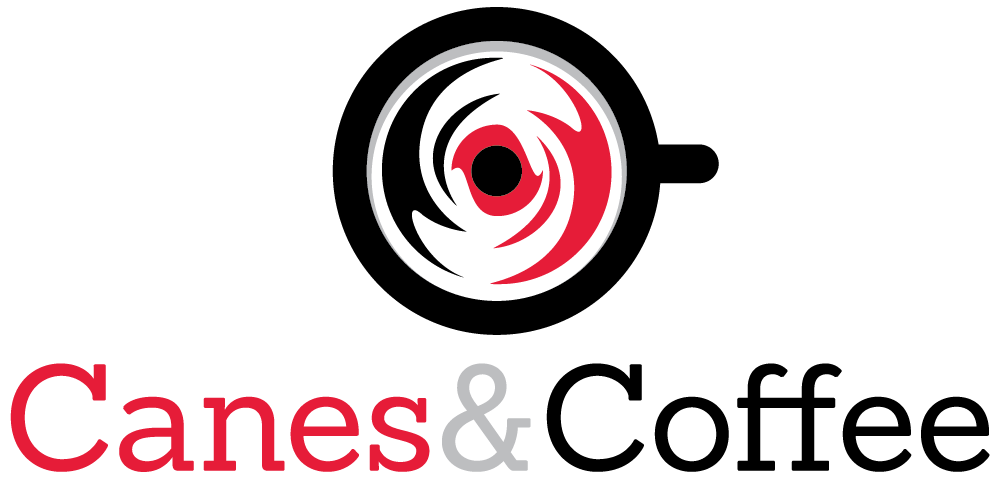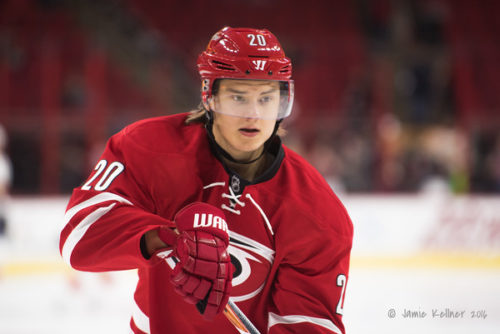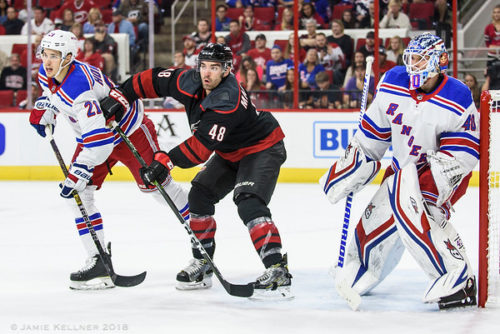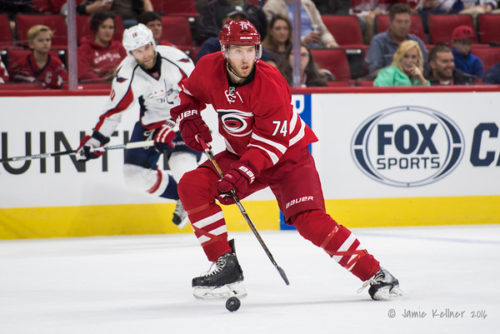End of offseason / Beginning of new season coffee drive
First, a huge thank you to everyone who has contributed to Canes and Coffee in the past. Your generosity is greatly appreciated, and the site would not exist without your support.
With preseason underway, Canes and Coffee is officially starting its fourth year covering Carolina Hurricanes hockey. The site runs on a lean budget and is founded based on a love of our hockey team, but there are still bills and expenses.
If you appreciated daily coverage to help get through the long offseason, please consider contributing $4 to a buy a cup of coffee as a thank you. If you are looking forward to another full season of daily Canes coverage, please consider contributing $4 to buy a cup of coffee to help fuel what lies ahead. Tips are welcome too. ?
With real Canes hockey only a day away, the site is getting busier. Today check out also the reopening of The Coffee Shop with a set of polls and discussion questions on the team’s 2018-19 performance.
Gauging offseason improvement
As a team that found itself out of the playoff chase early again in the 2017-18 season, the Hurricanes were one of 15 teams that entered the offseason needing to improve to return to the playoffs for the 2018-19 season.
The true verdict will of course be rendered on the ice, but with the season now only a couple days away, the timing is right to do a first assessment of whether the Carolina Hurricanes improved during the offseason and maybe more significantly whether the team has improved enough.
Goaltending
The biggest Achilles’ heel in recent years has been the team’s goaltending. Long time starter Cam Ward had faded over the years, and consecutive attempts to add help from outside in the form of Eddie Lack and Scott Darling had failed massively. Lack never really reached even ‘capable backup’ level for more than a few games here and there during his two seasons with the team. And after being acquired via trade and signed to a pricey $16.6 million four-year deal, Darling showed up out of shape, failed to start and had an atrocious 2017-18 season.
In what has been a yearly offseason ritual of late, the team entered the offseason desperately needing to somehow work with or around the contracts already in place to find goaltending that was at least league average. The fact that the yearly call is for “league average” in itself tells you just how bad things have been.
With three years and more than $12 million remaining on his contract, the Hurricanes decided to give Scott Darling another year to try to rebound.
And staring at a goalie market that lacked great options, the team went with an inexpensive, one-year trial on Petr Mrazek to replace Cam Ward.
To put it bluntly, the goalie situation for the Hurricanes is a dice roll for the 2018-19. Neither Darling nor Mrazek was good enough to be a starter on a playoff team in 2017-18, so the team is effectively placing a bet that at least one of the two will find a higher gear in 2018-19.
Could it work? Sure. Goalies in general can be erratic, so it is certainly possible that one of the two goalies finds his game. But counting on two sub-par 2017-18 goalies in 2018-19 is unmistakably a high stakes dice roll.
The wild card in the situation could be the team’s defense. In replacing promising but not there Noah Hanifin with Dougie Hamilton and then adding Calvin de Haan on top of that, the team is both improved and deep on the blue line. Could a sounder defense be exactly the ingredient needed to boost the goaltending? One can hope.
Summary assessment: Looking simply at statistics and probabilities, the team did not improve in net. It is counting on outcomes way on the right end of the bell curve of possible outcomes to improve at the position.
Defensemen
One underlying story of the struggles of the 2017-18 season was the fact that the hopeful strength of the team on the blue line just never materialized. Jaccob Slavin had a decent year but took a small step down from the previous season especially on the penalty kill. Brett Pesce had a similar year as a steady, reliable defensive defenseman but did not really grow offensively. And below that, the team had issues. Justin Faulk continued a down trend defensively such that not only was he not an anchor for a second pairing but he really just was not playing at that level at all. Noah Hanifin continued to show promise at times, especially offensively, but was still short of being consistent enough defensively to be trusted in a top 4 role, so he played his third season learning on the job in the bottom pairing. Haydn Fleury had a respectable rookie season, but the fact that he pushed up into the top 4 says a lot about the situation. Trevor van Riemsdyk performed well in his role solidifying the third pairing, but when you have to jump from the #2 defenseman down to the #6 defenseman to find the next success story, that is telling.
With a new sheriff in town in the general manager level, the team made a blockbuster trade parting ways with the thus far unrealized potential of Noah Hanifin and Elias Lindholm and netted a higher-end top 4 defenseman in Dougie Hamilton. Then to fill out the top 4, the team also added another sound and steady top 4 defenseman in Calvin de Haan. Justin Faulk spent the front part of the summer on the trading block (trading him was part of the plan in my opinion) but because of lack of viable trade options, Faulk looks destined to at least start the team with the Hurricanes which makes the team even deeper.
Summary assessment: Barring injuries, the team enters the 2018-19 season significantly stronger on defense having added two more proven top 4 defensemen to the mix. The burning question is what level of impact the blue line can have on two other key areas. Can a stronger back end provide more scoring and drive possession and transition chances that also boost forward scoring? Can a stronger defense be a key ingredient for improved goaltending? My thinking is that just being steadier on defense without impacting other areas of the game will be a positive by not enough for 2018-19 success.
Forwards
The Hurricanes exited the 2017-18 season in the bottom third of the league in goal scoring and also sub-par in terms of power play proficiency. That makes for a perfect three for three in terms of on-ice areas that needed to improve over the offseason.
The forward position will see a significant transition in terms of personnel. Gone are Jeff Skinner, Elias Lindholm, Lee Stempniak, Derek Ryan, Marcus Kruger, Josh Jooris and Joakim Nordstrom from this time last year. In addition Victor Rask is out long-term with a hand injury. Only six forwards who played more than 40 games with the Hurricanes in 2017-18 return. In their place are two veterans in Micheal Ferland and Jordan Martinook and young newcomers Valentin Zykov, Lucas Wallmark, Warren Foegele, Martin Necas and Andrei Svechnikov.
When one considers the departure of Jeff Skinner and that the majority of the new faces are rookies, the team is making a huge bet on young talent emerging quickly in terms of being able to score enough to win consistently.
The positive is that the young players stepping into the lineup for the most part are players who do project to be good offensive NHL players. Svechnikov was the best forward in the draft and projects to be a 30 goal scorer….someday. Martin Necas similarly projects to be a capable offensive center within a few years if not sooner. Lucas Wallmark and Valentin Zykov are both coming off huge offensive seasons at the AHL level. And though his style of play is that of a rugged grinder, Warren Foegele is not without scoring ability.
The downside is that the timing for how long it takes this young group to develop is a complete unknown. Wallmark and Zykov have sort of built their way up to this level and hopefully are capable of just carrying forward what they did last season in the AHL. But anyone who says that Necas and Svechnikov are sure things for big point totals in 2018-19 are hoping not projecting based on logic.
Summary assessment: At the end of the day, because of the large volume of unproven youth in the lineup, the Hurricanes forward group is very much a dice roll just like the goalie position. The upside is there for this group to take a step forward, but that requires at least a few unproven players to hit the ground running at the NHL level at a young age. If instead, the young group trends toward ‘learning on the job’ then this group could again be short on offensive fire power.
Coaching
I have a half-written article somewhere that suggests that the recent fate of the Carolina Hurricanes could have been significantly different if Rod Brind’Amour had been the head coach and Bill Peters an assistant. What became clear over Peters’ three years in Raleigh was that his strength was details and to some degree systems and such. Especially in the early going, he was able to coax decent possession-type metrics out of a sub-par lineup. But where he seemed to come up short was the critical skill of understanding and managing the people side of the game.
His single greatest motivation of a player was arguably the awkward and haphazard blasting of Eddie Lack out of frustration after the 2016-17 season was more or less gone. That was clearly unintentional but at the same time a stark sign that if Peters could find the right way to push buttons, there was more to be had from the individuals in the locker room.
The dual captaincy last year was another clear sign that he just did not get it, and maybe not surprisingly his team crumbled again in the winter of 2018.
Enter Rod Brind’Amour. His head coaching experience is down at the ‘coaching his kid’ level, so at least in this role, he is incredibly green. I lobbied during the summer for the addition of an outsider with more run time in a head coaching role, but Brind’Amour mostly stayed internal for building his staff and did not add head coaching experience from outside. So the burning question is whether Brind’Amour’s wealth of experience as a player and a leader combined with a few years as an NHL assistant will translate to his new role as the top guy.
At a basic level, I think the single biggest thing for this team entering the offseason was finding a reset button on culture, attitude and leadership. There is reason for optimism that Brind’Amour’s leadership, Williams as captain and a significant roster changeover at least have the potential to accomplish that. But even if that top priority is addressed, there is still the task of managing more of the nuts and bolts of systems, match up ups, preparation and all of the tactical parts of being a head coach. In that regard, I think it is fair to call Brind’Amour a question mark.
Summary assessment: I voted yes on Brind’Amour as a head coach because I believe he is equipped to address the culture and attitude issue that is priority #1. But I still have to declare coaching a third wild card simply because Brind’Amour has never been in a head coaching role of any variety at the professional level.
Netting it out
When I net out the Carolina Hurricanes attempt to improve over the offseason, it goes like this…
The team really only improved for certain on the blue line, and that improvement was significant and with the potential to impact other key areas of the game.
In terms of goaltending, the forwards and the coaching, I think the ceiling for 2018-19 is fairly high for all three, but I would consider all three to be more dice rolls with possible positive outcomes than certain improvement.
The goaltending gets a new option in Petr Mrazek, the removal of Cam Ward’s shadow, a new coach hopefully is better at helping players reach their potential and also just a fresh start after some time off. But neither option was good in enough in 2017-18, so aside from saying ‘it cannot get worse’, I am not sure how you can declare certain improvement.
Half of the forwards return and half are basically unproven kids. The youth should bring more offensively but also more learning mistakes. Improvement will not come from higher offensive ability; it will come when these players emerge and reach up toward their ceilings. That could be in October or it could be in two years. Again, it is a dice roll.
Finally, the single greatest wild card is new head coach Rod Brind’Amour. If he can inject a Peter Laviolette type swagger, attitude and confidence into this group, that alone could left the entirety of the roster and make detailed player and roster evaluations irrelevant. But Brind’Amour is also inexperienced in his new role which could have its own learning curve.
So in total that makes one area of clear improvement and three areas that are dice rolls wild cards. So those who want to pinpoint a specific result for the 2018-19 season have an immense range of possibilities that are defensible depending on what you assume for the unknowns. If nothing else, that definitely makes things interesting and worth watching as the season starts to unfold on Thursday.
Go Canes!




Matt
I agree with your assessments on all areas. I think it will be a struggle for this team in a very competitive league. The more things that have to go right for this team, the less likely they are to make the playoffs. Having 3 areas that are uncertain stacks the odds against us. The difference this year is that there is most certainly hope for the future. My hope is that we see significant improvement as the season progresses and that next year will be the one that sees us sneak in. Hope I am wrong, but the preseason is not enough to convince me we will break the drought.
That about sums it up, taken as parts.
What RBA has stated will be different is an aggressive style of play, leaning more offense than defense. That is a refreshing change from what we’ve had, and a refreshing change from most retooling teams. Most retooling teams try to lock it down on defense, scoring only opportunistically, and try to squeek out a 1-0 or 2-1 win.
That conservative strategy is usually embraced because the team is stocked with serviceable players while you look to add speed, skill, and grit.
Well, we have speed skill and grit. These are not players who are keeping the seats warm while we look for better players. These are the players we want.
So the biggest factors in success will be the coaching staff and veteran leadership. Can they teach and instill confidence at the same time, so the players we want reach toward their ceilings.
And in the meantime, we will be treated to games that look a lot like our last two pre-season games against WAS and NAS starters: 5-4 games that could go either way.
What a nice change!
With Darling’s injury and McElhinney’s pick up off waives, goaltending might be a little less uncertain. At least for short periods.
And as far as Rod’s coaching, at least he’s giving us entertaining hockey. If everything goes right, we make the playoffs, if everything goes wrong, at least we won’t be the dumpster fire that Ottawa is at the moment.
Hockeybuzz´s Eklund predicts a #8 spot in the Metro for the Canes and says the best case scenario is Jack Hughes, goes to show the outsiders’ view on the team has not changed.
I think the team, realistically, has not improved overall for this year but should be a lot more fun to watch and has huge potential for significant improvements in the next couple of years.
I wouldn’t mind a Jack Hughes for #1 center and the rest of the young guns with another year of experience under their belts next fall.
But the team shouldn’t play like that, play to win, play to entertain, play hard, we’ll see where it takes us.
I definitely think the Canes miss the playoffs this year but 8th in the metro? To think that right now the Canes are worse than the Islanders is a bit of a stretch. I was even looking at the Rangers top to bottom lineup and thought okay the Canes should REALLY be battling for 6th in the metro this year with New Jersey with a very very outside shot of competing for a wild card position. EKlund is a little pessimistic to predict last in the metro…
The Canes are really tough to handicap for the reasons explained perfectly by Matt above. Recency bias works against the team, with most pundits frustrated from past hopefulness the team would make the playoffs. I’m interested in the effect of the team being significantly more difficult to play against will have on outcomes. Svech, Zykov, Ferland and Foegele have the mass and muscle to effectively work in front of the net, Each replaces a player on last years team who were easily neutralized when near the crease. Last season teams could out muscle the Canes in late game situations that led to late game leads becoming loses That will not be as easy to do this season. That intangible, grit, may be reason this season goes better than logic otherwise might explain.